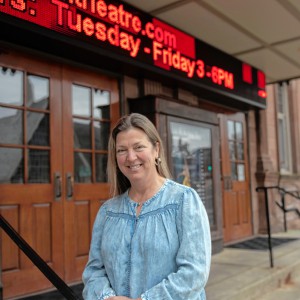Soaring toward success: 3,000 feet in the air, Valley teens learn leadership, responsibility in Civil Air Patrol’s cadet program
| Published: 08-09-2023 4:14 PM |
High above the Pioneer Valley and the rolling hills of the Berkshires on a hazy evening, rising Northampton High School senior James Bertone-Johnson made an announcement to the other two passengers.
“I have controls.”
At that moment, nearly 3,000 feet in the air, the 17-year-old Civil Air Patrol cadet took full control of the Cessna Skyhawk heading more than 100 mph northwest toward North Adams as the first of his five orientation flights.
“It’s a totally different perspective, you experience the world in a different way,” Bertone-Johnson said after the flight. “It feels kind of freeing, you’re able to move 360 degrees.”
The flight began at the Northampton Airport and chartered a path toward North Adams’ Harriman and West Airport, before circling around Mount Greylock, the highest point in the state, and returning back to the Pioneer Valley.
While a unique experience for the average person, Bertone-Johnson’s flight is just another part of being a member of the Civil Air Patrol, the civilian auxiliary branch of the United States Air Force. In the Civil Air Patrol’s cadet program, kids and teens focus on four content areas: leadership, aerospace, fitness and character. Each of these areas all culminate in the force’s ultimate goal of teaching cadets to broaden their perspectives, assume responsibility and gain self-confidence and set goals for their lives.
Locally, the Brig. Gen. Arthur J. Pierce Cadet Squadron is based out of the University of Massachusetts Amherst and welcomes cadets aged 12 through 18 from Franklin and Hampshire counties. Cadets aged 19 through 21 can join as senior members, but must be enrolled in a specialty track, such as cadet programs, communications, emergency services, historian or public affairs.
Currently, there are 14 cadets from various backgrounds enrolled in the squadron, who meet each Monday for a weekly meeting at UMass and also attend other Civil Air Patrol events.
Article continues after...
Yesterday's Most Read Articles
 Granby Bow and Gun Club says stray bullets that hit homes in Belchertown did not come from its range
Granby Bow and Gun Club says stray bullets that hit homes in Belchertown did not come from its range
 Super defers Amherst middle school principal pick to successor; one finalist says decision is retaliation for lawsuit
Super defers Amherst middle school principal pick to successor; one finalist says decision is retaliation for lawsuit
 Political newcomer defeats Shores Ness for Deerfield Selectboard seat
Political newcomer defeats Shores Ness for Deerfield Selectboard seat
 ‘Home away from home’: North Amherst Library officially dedicated, as anonymous donor of $1.7M revealed
‘Home away from home’: North Amherst Library officially dedicated, as anonymous donor of $1.7M revealed
 Town manager’s plan shorts Amherst Regional Schools’ budget
Town manager’s plan shorts Amherst Regional Schools’ budget
 Annette Pfannebecker: Vote yes for Shores Ness and for Deerfield
Annette Pfannebecker: Vote yes for Shores Ness and for Deerfield
And on top of the character skills and education one receives, cadets are also eligible for five orientation flights, with a trained instructor – in Bertone-Johnson’s case, 2nd Lt. Morgan Hall took the lead – where they learn how to run through a pre-flight inspection and get an opportunity to take control of the plane in flight and do some basic maneuvers, including banking turns. Takeoff and landing, however, are handled by the instructor.
Hall said each orientation flight is focused on a specific subject, like weather, air traffic, high-angle turns and other, similar matters. In his role, Hall said they’re trying to give cadets a sense of what goes into flying a plane, especially because many of them have little or no prior experience.
One key point Hall brought up before taking off on July 26 was pilot awareness and where you should be looking when in control. Typically, he explained, many people focus on the internal controls and screens inside the plane, but he instructs cadets to focus their eyes on the outside world 75% of the time to survey other air traffic and the environment, and then the remaining 25% of the time analyzing the inside of the plane, including the air speed, altitude and other vital measurements.
On top of the five orientation flights in a powered plane, cadets are also eligible for five Civil Air Patrol glider flights, as well as five balloon flights, although Hall said balloon flights are only available in the Midwest.
There are numerous paths to joining the Civil Air Patrol, with two of Bertone-Johnson’s fellow members of the current squadron taking far different routes.
For Elwin Binu, 16, he found the squadron after moving to the U.S. from the United Arab Emirates and was intrigued by the leadership skills he could gain, as well as exploring aerospace engineering. Binu said he’s been a member of the squadron for approximately a year.
“It’s been great and something that motivates me,” the Frontier Regional School student said. “One thing that I think really brings me to join every meeting is the responsibility that I am encouraged to take … it’s something that can help me grow as a person.”
Meanwhile, fellow member and Franklin County Technical School student Camryn Laster, 16, said he’s always had an interest in a military-adjacent program – his father is a U.S. Marine Corps veteran – and figured that joining the Civil Air Patrol would go hand-in-hand with his pilot’s license training. The July 10 meeting he attended was one of his first, as he had only been with the Civil Air Patrol for about a month and a half.
“It feels good being a part of something, it’s like a team,” Laster said. “They’re super nice people and it’s really fun, especially the stuff we learn.”
Each meeting is cadet-led, with time for drill instruction and classroom time, where one of the cadets will research a topic and present their findings to their peers. Lt. Col. Thomas Williams said this responsibility teaches the kids to be accountable and imparts leadership and organizational skills.
“I would rather see a disaster of a meeting then a perfect one run by me,” Williams said. “The point is they learn how to run a meeting.”
Despite being an auxiliary branch of the U.S. Air Force, there is no military commitment required. If interested in joining one of the U.S service academies, Civil Air Patrol service can make cadets’ applications more competitive and those directly joining the military can start at a higher pay grade if they earn the 2nd lieutenant rank.
In Binu’s case, he said the military isn’t something he’s anticipating to pursue, but the skills he absorbs and develops can help him in the future.
“The leadership and the volunteer service are things I want to instill as a part of my core being,” Binu said. “I want to be a microbiologist or something in that field … no matter what I end up doing, the lessons I learn, especially the leadership and communication, will help me out."
For Laster, he’s still trying to figure out what he wants to do, but imagines it will involve flying a plane in some way shape or form, so Civil Air Patrol is an opportunity to brush up on those skills. He said he thinks he wants to join a reserve force for the military and then end up being pilot for the United States or for a private airline.
The Brig. Gen. Arthur J. Pierce Cadet Squadron was founded in the mid-20th century as the Franklin County Flying Club, which became the Turners Falls Cadet Squadron and the Franklin County Cadet Squadron, before recently adopting its current name, according to squadron Deputy Commander Gary Longley.
Longley, who has previously served on the Greenfield Public Safety Commission, said he has been a member of the squadron since 1964 and he said the program has been an invaluable resource in his life.
“As a cadet I got a lot out of the program,” Longley said, adding that beyond the translation of leadership skills into his professional life, he was able to meet President Richard Nixon and legendary pilot Chuck Yeager. When his unit was in Europe, they were also able to go beyond the Iron Curtain for a day and briefly saw what life was like in eastern Europe. “That was a real eye-opener.”
While those once-in-a-lifetime experiences stick out, it’s the everyday skills imparted on Civil Air Patrol cadets and members that make it worth it. As someone who has been in a leadership role in the Civil Air Patrol for years, Longley said he’s seen kids and teens from all backgrounds grow into responsible adults.
“I think the thing I enjoy the most is the character development,” he said. As kids grow and mature throughout their time in the program, he joked that a common response he hears from parents is, “I don’t know what you did to my kid,” because the kids often show a dramatic growth in responsibility and self-confidence.
“These are great experiences, but it also challenges them to go out of their comfort zone,” he added. “I watch these kids grow up.”
The Civil Air Patrol meets each Monday from 6 p.m. to 8:30 p.m. at UMass Amherst on the ground floor of Dickinson Hall. Those interested in joining can contact Lt. Col. Thomas Williams at Pierce.CAP-Recruiting@mawg.cap.gov or visit the squadron’s webpage at ma013.cap.gov/join.
Chris Larabee can be reached at clarabee@recorder.com or 413-930-4081.

 A DIY approach to flying: Local pilots build and help build their own aircraft
A DIY approach to flying: Local pilots build and help build their own aircraft You’re up next: Western Mass open mic scene heats up post-pandemic
You’re up next: Western Mass open mic scene heats up post-pandemic One upon a story slam: This year’s Valley Voices winners head to a final competition
One upon a story slam: This year’s Valley Voices winners head to a final competition Preserving a key part of Emily Dickinson’s legacy: Historic Evergreens house reopens at the Emily Dickinson Museum
Preserving a key part of Emily Dickinson’s legacy: Historic Evergreens house reopens at the Emily Dickinson Museum